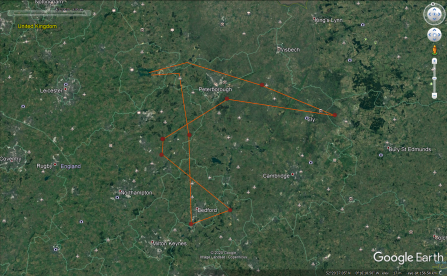Things at the Manton Bay nest have calmed down a little this week since Maya has laid the full clutch of eggs for this season. For the next few weeks, Maya and 33(11) will be taking it in turns to incubate, with 33 being very keen and almost pushing Maya off sometimes, so he can have a turn! They are both always really careful when moving around the nest and try and tuck their claws in as much as possible as well as moving around on the “elbows”, or tarsometatarsus for want of the proper term. 33 and Maya have continued to bring new material back to the nest, for example on Friday Maya decided to bring a large stick back which she clumsily moved it about, poking and bopping 33 in the process.
A full clutch
Peter Cairns/2020VISION
Both male and female Ospreys have brood patches allowing both sexes to incubate, but females will incubate most of the time, for longer durations and generally will incubate over-night. Brood patches are bare patches of skin on the underside of a bird, which are well supplied with blood vessels enabling heat to be transferred from the bird to the eggs whilst incubating. Research shows that the extent that male Ospreys will participate in incubation duties depends greatly on the individual. From 2019’s data, 33 partook in 14% of incubation duties, and spent a weekly average of 41 minutes incubating the four eggs. Osprey eggs need incubating for around 37 days after which they will hatch in the order that they were laid, so potentially there will be over a week between the first and last egg hatching.
Over the Easter weekend, satellite tagged Osprey S1(15) went on a little adventure! Over the course of two days he travelled over 200 miles and went so far that he entered Suffolk, Bedfordshire and Hertfordshire. But why would he travel so far? A theory we have is that he was simply chasing another male away from where he is currently holding territory, and he just wanted to make sure he had seen the intruder off.

Last week we reported on our social media pages that sadly it looks like male 28(10) isn’t going to return to Rutland this year. Back in 2014 he attempted to breed with Maya, who even laid eggs, before 33(11) took over the nest. 28 has since been paired up with another female from 2015 and has successfully raised chicks of his own. Saying this, we have had Ospreys turn up much later than we expect, so we are still hoping that 28 will be back.
World Osprey Week at home activities
As school closure continues, the Osprey Education Team are adding more wildlife activities for youngsters to do at home each week. Please visit the World Osprey Week page for more information.

